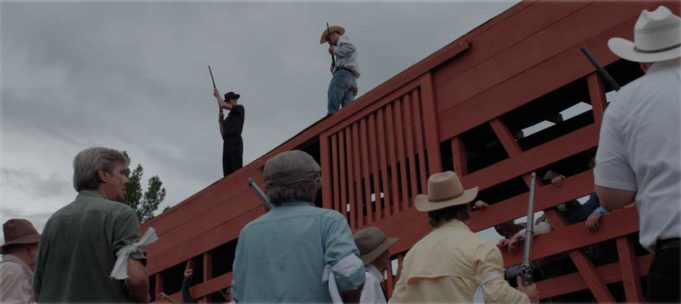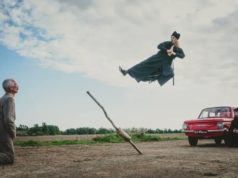I wanted to pay tribute to as many films as possible this year, which is why I left the docs off my Top 10 list from two weeks ago and reserved them for this article. Not making this list is the much-lauded Hale County This Morning, This Evening, one of a small group of 2018 films that I think I might have liked better had I seen it in a theater instead of on my small computer screen. As always, hyperlinks in this article go to the films’ websites, though I also link to my own reviews of the films when they’re applicable.
1. Bisbee ’17. Bisbee was once Arizona’s richest city and is now one of its poorest, which tends to happen when mining towns’ mines are shut down. In 1917, the city’s police (at the behest of the copper mining company) deported hundreds of mostly Mexican and Slavic miners en masse who were trying to unionize for better working conditions. Many of the men died across the border in Mexico. One hundred years later, the citizens of Bisbee gathered on a comparable scale to re-enact this shameful event. Robert Greene’s documentary reminds me of Joshua Oppenheimer’s great The Act of Killing, as he finds the people of Bisbee gaining a fresh perspective on Donald Trump’s immigrant-hating America by acting out a similar action from the past.
2. Minding the Gap. This is a skateboarding documentary, but it is about so much more than that. Bing Liu was still a boy when he started filming his friends in Rockford, Ill., doing tricks on their boards. When he got older, he started noticing that most of them were, like himself, being beaten at home by their fathers or stepfathers. Liu draws a compelling portrait of his charismatic buddy Zack Mulligan, now repeating the same patterns in his home that he learned in his childhood. (“You shouldn’t beat up women, but some bitches gotta get slapped.” He says that after his girlfriend says he threw her through a coffee table.) Even more gripping is when Liu sits his own Chinese immigrant mother in front of the camera to ask her why she let her husband hit him and his little brother.
3. Free Solo. For sheer visual splendor on sheer rock faces, Jimmy Chin and Elizabeth Chai Vasarhelyi’s portrait of their rock-climbing friend Alex Honnold earns its spot on this list. As I said in my review (“Driven Up the Wall,” Nov. 28, 2018), the film is about more than just detailing Alex’s attempt to climb El Capitan without any aids. It’s also a portrait of how it probably takes a lopsided man like him to accomplish such an extreme feat.
4. Shirkers. Netflix continues to be a great boost for the documentary trade. In 1992, Sandi Tan was 19 years old and trying to write and direct her own film in her native Singapore with two of her friends and a film teacher who claimed to be an American who worked on the set of Apocalypse Now. In the present day, she tries to track down the footage from her abandoned student film and journeys back to the lonely and disaffected girl she was and the country that was then a jungle backwater instead of Southeast Asia’s financial center. The more she finds out about her now-deceased professor, the weirder the story becomes and the further you’re pulled into this cinematic detective story.
5. Three Identical Strangers. Tim Wardle’s film is not a Holocaust documentary, yet I found it just as quietly chilling. This story began in the 1980s, when teenager Robert Shafran went to community college in upstate New York and found everyone calling him “Eddy.” The two young men met and found that they were triplets separated at birth by a 1950s adoption agency that secretly did this to multiple births as part of a diabolical social engineering experiment. It sounds worthy of the Nazis, but it was American Jews who did this to other Jews. We don’t know what results the experiment yielded because the bad guys were never called to account, but we do know the separation inflicted permanent damage on the children and their adoptive parents. This odd story has an enraging end.
6. Bathtubs Over Broadway. David Letterman used to have a recurring comedy bit called “Dave’s Record Collection,” and Steve Young was a writer tasked with digging up unintentionally funny recordings to use for The Late Show. Young wound up stumbling on mid-20th century LPs and films of elaborate musical-theater shows produced for business conventions, with not-yet-famous songwriters and actors singing the praises of dishwashers, banks, or hot dogs for audiences made up solely of conventioneers. Through his enthusiasm for these shows, a jaded comedy writer finds joy again by befriending a host of older showbiz folks. Also, the song “My Bathroom” from the musical The Bathrooms Are Coming! is weirdly hummable.
7. People’s Republic of Desire. If you think internet culture is insane in this country, look at China. Wu Hao’s film tracks various contestants competing to be the most popular livestream blogger on YY, one of China’s 20 or so social media platforms. The whole thing is basically a giant pyramid scheme in which bloggers pour thousands of dollars of their own money into winning the contest, sometimes seeing their biggest fans and financial supporters become internet celebrities and turn into their competitors. In the end, the only winner is YY. We’re all part of the popularity contest that is the internet (by the way, please like this article on Facebook!), and this movie shows us just what kind of rabbit hole it’s all leading to.
8. Scotty and the Secret History of Hollywood. Not for nothing does Scotty Bowers describe his sexual orientation as “everything.” Recently, he wrote a tell-all memoir describing his life in Hollywood in the 1940s introducing secretly gay movie stars to sex partners, earning good money from activities that fall into a gray area between dating service and pimping. Matt Tyrnauer’s film makes the case for the significance of Scotty’s book, but ultimately, the film is less interesting for its dishing on Cary Grant and Katharine Hepburn than it is as a portrait of Scotty as a deeply scarred war veteran with major mental issues who nevertheless lives to see society’s attitudes to gays change unimaginably.
9. Won’t You Be My Neighbor? By all rights, this movie should be intolerable. It certainly would have been with a lesser filmmaker taking on the subject of Mister Rogers. Yet such is the skill of Morgan Neville’s directing that Fred Rogers’ soft-pedaled message of love and understanding comes across. As I said in my review of the film (“Right Said Fred,” June 21, 2018), Fred Rogers believed in kindness in such a way that makes his message even more radical now than it was in his time.
10. The Road Movie. I know a list like this is supposed to be high-minded and stuff, but I can’t stop watching this Russian film that is 67 minutes of dashcam footage from various drivers edited together. It seems in Russia, civilians install dashboard cameras in their cars to prevent cops from messing with them, but here the cameras have captured car accidents that you didn’t even think were possible, as well as terrifying weather phenomena, vodka-fueled idiocy, epic cases of road rage, and just as epic cases of road calm — one pedestrian crossing a street narrowly avoids being smooshed by a skidding garbage truck and then walks on like nothing happened. You can take this as a street-level portrait of modern-day Russia, but I’ll watch it just to see that giant oil tanker truck go airborne.
Honorable mention: Corneliu Porumboiu’s Infinite Football; Kevin Macdonald’s Whitney; Morgan Neville’s They’ll Love Me When I’m Dead; Stephen Schible’s Ryuichi Sakamoto: Coda; Cameron Yates’ Chef Flynn; Alexis Bloom’s Divide and Conquer: The Story of Roger Ailes; Cristina Constantini and Darren Foster’s Science Fair; Julie Cohen and Betsy West’s RBG; Kate Novack’s The Gospel According to André; Koki Shigeno’s Ramen Heads.












